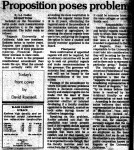Some advice for anyone interested in being student regent – or, if the regents approve the position in their next meeting, the student adviser to the regents: Stop playing nice.
As much as students like to argue that they can work with the administration in the quest for more plentiful resources and better accessibility, what’s best for students is not necessarily what’s best for the University. And anyone working with the University of California Board of Regents must struggle, not only to determine what’s best for whom, but who they are voting for each time they meet.
For the voting members with vested interests in business, education and industry, this internal conflict may not keep them up at night. But for the single voting student member, determining the role of their vote is more difficult.
The UC student regent is fairly unique, for, among other reasons, the fact that they sit on a board that is not necessarily held accountable by students – the student regent is selected by the current board.
The position was established through a ballot proposition, which passed with 55 percent of the vote, intended to improve faculty and student representation at the UC.
The Bruin reported in an article titled “Proposition poses problems” on Oct. 31, 1974 that the American Federation of Teachers released a statement explaining their doubt in the idea of a faculty regent.
“No one, for example, can seriously suggest that the way to serve the private interests of employees in a private corporation is to have an employee on the board of directors,” the statement said.
Staff writer S.J. Nadler explained, “The union believes that effective representation for those who work in education ‘can only be achieved by means of the collective bargaining process.'”
While UC community members raised the same concern about the student regent before the 1974 election, the first UC student regent was appointed in 1975.
Since then, other public universities have appointed students to represent their peers on their boards of regents, but often – as is the case in Texas and Nebraska – these students are not voting members.
Their positions, instead, are more similar to that of the UC’s proposed student adviser to the regents. They represent student interests in meetings, vouching for student issues, but hold no effective decision-making power.
Last Thursday, The Bruin published an editorial calling the position more of a publicity stunt than a victory for student advocacy. In response, UC community members sent the Bruin several submissions conflating the student adviser position with gains in student advocacy more related to grassroots student activism than representation at the closed-door meetings both the student regent and possible student adviser positions create.
Among their examples was private prison divestment, improved Title IX policies and regents’ attempts to preserve the University’s affordability.
In a submission by Rafael Sands, a former Bruin contributor and current policy director for the student regent’s office, he wrote that the student adviser would be able to advocate for students with his or her ” ability to contribute meaningfully to board and committee discussions and have private and personal conversations with regents.”
This is student power post-1974. It’s about private conversations, “meaningful” contributions and measuring student activism’s success to the number of closed-door meetings gained – which is to ignore the crowds of students who have pounded on those doors for decades.
